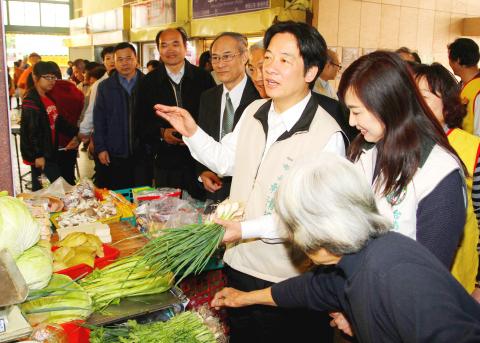Greater Tainan Mayor William Lai (賴清德) said yesterday that his municipality refused to adopt revised high-school curriculum outlines established by the Ministry of Education, adding that all municipal high schools would keep the current outlines.
Lai’s remarks came in the wake of the ministry’s move on Monday to approve a new high-school curriculum on Chinese literature and social sciences that it said contained “slight adjustments” based on the Constitution.
Among the approved changes were calling the era of Tokyo’s rule of Taiwan the “Japanese colonial period” and referring to China as “Mainland China” in textbooks.

Photo: CNA
Lai said the ministry’s adjustment was made less than two years after the implementation of the current outlines, four years shorter than the legally regulated implementation period of six years, and would baffle teachers and students.
Moreover, the adjustment distorts historical facts and the mainstream understanding of Taiwan’s history, and was an attempt to “brainwash” Taiwanese school pupils, he said.
The Democratic Progressive Party (DPP) mayor said the city’s four municipal high schools would continue using the current curriculum and urged the national high schools in the city and textbook publishers to challenge the ministry’s change of outlines.
Separately yesterday, DPP Chairman Su Tseng-chang (蘇貞昌) said that the DPP caucus would make clear the party’s refusal to accept the change in the new legislative session and he urged DPP-governed cities and counties to “take the necessary and stringent measures” against the adjustment.
Pro-Taiwan supporters, historians and the DPP have described the adjustment as a “de-Taiwanization” effort that is trying to instill students with a “Greater China” historical perspective.
Former Academia Historica president Chang Yen-hsien (張炎憲) said the adjustment was an overhaul of the outlines — not “slight changes” — and also failed to tell Taiwan’s real history.
The changes focus on rebuilding the historical connection between Taiwan and China as well as the perspective of Han Chinese, and ignore Taiwan’s identity and diverse cultures, Chang said.
Chang said the ministry’ unilateral act has drawn a strong backlash from historians and high-school teachers.

INVESTIGATION: The case is the latest instance of a DPP figure being implicated in an espionage network accused of allegedly leaking information to Chinese intelligence Democratic Progressive Party (DPP) member Ho Jen-chieh (何仁傑) was detained and held incommunicado yesterday on suspicion of spying for China during his tenure as assistant to then-minister of foreign affairs Joseph Wu (吳釗燮). The Taipei District Prosecutors’ Office said Ho was implicated during its investigation into alleged spying activities by former Presidential Office consultant Wu Shang-yu (吳尚雨). Prosecutors said there is reason to believe Ho breached the National Security Act (國家安全法) by leaking classified Ministry of Foreign Affairs information to Chinese intelligence. Following interrogation, prosecutors petitioned the Taipei District Court to detain Ho, citing concerns over potential collusion or tampering of evidence. The

‘FORM OF PROTEST’: The German Institute Taipei said it was ‘shocked’ to see Nazi symbolism used in connection with political aims as it condemned the incident Sung Chien-liang (宋建樑), who led efforts to recall Democratic Progressive Party (DPP) Legislator Lee Kun-cheng (李坤城), was released on bail of NT$80,000 yesterday amid an outcry over a Nazi armband he wore to questioning the night before. Sung arrived at the New Taipei City District Prosecutors’ Office for questioning in a recall petition forgery case on Tuesday night wearing a red armband bearing a swastika, carrying a copy of Adolf Hitler’s Mein Kampf and giving a Nazi salute. Sung left the building at 1:15am without the armband and apparently covering the book with a coat. This is a serious international scandal and Chinese

Seventy percent of middle and elementary schools now conduct English classes entirely in English, the Ministry of Education said, as it encourages schools nationwide to adopt this practice Minister of Education (MOE) Cheng Ying-yao (鄭英耀) is scheduled to present a report on the government’s bilingual education policy to the Legislative Yuan’s Education and Culture Committee today. The report would outline strategies aimed at expanding access to education, reducing regional disparities and improving talent cultivation. Implementation of bilingual education policies has varied across local governments, occasionally drawing public criticism. For example, some schools have required teachers of non-English subjects to pass English proficiency

TRADE: The premier pledged safeguards on ‘Made in Taiwan’ labeling, anti-dumping measures and stricter export controls to strengthen its position in trade talks Products labeled “made in Taiwan” must be genuinely made in Taiwan, Premier Cho Jung-tai (卓榮泰) said yesterday, vowing to enforce strict safeguards against “origin laundering” and initiate anti-dumping investigations to prevent China dumping its products in Taiwan. Cho made the remarks in a discussion session with representatives from industries in Kaohsiung. In response to the US government’s recent announcement of “reciprocal” tariffs on its trading partners, President William Lai (賴清德) and Cho last week began a series of consultations with industry leaders nationwide to gather feedback and address concerns. Taiwanese and US officials held a videoconference on Friday evening to discuss the